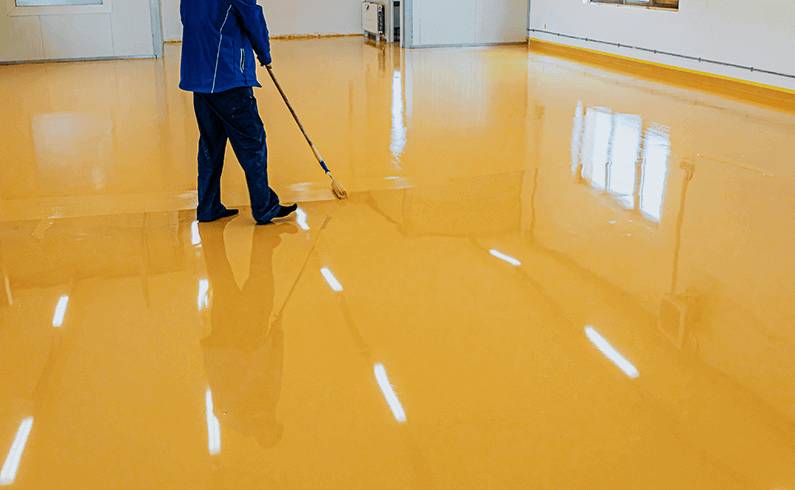Introduction
Choosing the right flooring for your space can be daunting, with countless options ranging from hardwood to tile to carpet. However, one option consistently stands out: the epoxy floor. Known for its impressive durability, aesthetic appeal, and low maintenance, epoxy flooring is becoming increasingly popular. But how does it compare to traditional flooring options? Let’s explore the reasons why epoxy flooring is the superior choice for homes, businesses, and industrial environments.
Understanding Epoxy Flooring
Before diving into the comparison, let’s clarify what an epoxy floor is. Epoxy flooring is created by combining epoxy resin with a hardener and applying it to a concrete surface. Once it cures, it forms a thick, smooth, and durable coating that adheres strongly to the concrete. The outcome is a high-gloss, seamless finish that is resistant to wear and tear, chemicals, and moisture, making it perfect for various settings.
A Brief Look at Traditional Flooring
Traditional flooring includes a wide array of materials, each with unique advantages and disadvantages:
- Hardwood Flooring: Offers a classic, warm aesthetic but requires regular maintenance and is vulnerable to scratches, dents, and moisture damage.
- Tiles: Durable and easy to clean but often come with grout lines that can stain over time.
- Carpet: Provides softness and comfort but is notoriously challenging to clean and can harbor allergens.
- Vinyl or Laminate Flooring: Budget-friendly alternatives to wood or tile but can wear out quickly and may not withstand heavy traffic as well.
Durability: Epoxy Floors Stand Strong
When it comes to durability, epoxy flooring is unbeatable. Traditional flooring materials like hardwood, tile, and carpet often suffer damage over time, including scratches, stains, and general wear and tear.
- Hardwood Floors: Although elegant, hardwood can be easily scratched, dented, and damaged by moisture. Even small spills can cause warping if not dealt with promptly.
- Carpet: High-traffic areas tend to wear down quickly, and spills or dirt can easily leave permanent stains.
- Tiles: Although durable, tile can crack under pressure or if heavy objects are dropped. Grout lines can also become discolored and difficult to maintain.
In contrast, epoxy floors resist impacts, stains, chemicals, and abrasions, making them ideal for garages, basements, warehouses, and kitchens—places where toughness is essential. Epoxy flooring can handle everything from heavy foot traffic to industrial machinery without showing signs of wear, making it a superior option for long-term use.
Maintenance: Easy Care with Epoxy
Another standout feature of epoxy flooring is its low maintenance requirements. Traditional flooring often demands ongoing upkeep to maintain its appearance and functionality.
- Hardwood: Requires regular polishing and refinishing to prevent wear. Even with care, scratches and scuffs are common.
- Carpet: Cleaning carpets can be labor-intensive, requiring regular vacuuming and deep cleaning to remove trapped dirt and stains.
- Tiles: Tile floors need frequent cleaning to avoid dirt buildup, particularly in the grout lines, which can discolor over time.
Epoxy floors are incredibly easy to maintain. Their smooth, non-porous surface resists dirt and spills, making cleanup a simple task. There’s no worry about staining, and without grout lines, you won’t face discoloration or buildup. A quick sweep or mop is all it takes to keep epoxy floors looking pristine.
Aesthetic Appeal: Modern vs. Classic
Epoxy floors provide a sleek, modern appearance that can be customized to suit nearly any style. From high-gloss finishes that create a reflective surface to matte options for a more subdued elegance, epoxy coatings can be tailored to meet individual preferences.
- Hardwood: While timeless and beautiful, hardwood floors may not align with modern or industrial design aesthetics.
- Tiles: Although available in a variety of patterns and colors, tile flooring can sometimes seem cold or sterile in residential spaces.
- Carpet: Although it offers warmth and comfort, carpet lacks the sleek and polished look that many people desire today.
Epoxy floors can be customized in various colors, textures, and even metallic finishes, providing a level of personalization that’s hard to achieve with traditional flooring. Whether you’re looking to create a contemporary industrial vibe for a showroom or a bright, glossy finish for a garage, epoxy coatings deliver both style and function.
Cost: Long-Term Value with Epoxy
While traditional flooring may come with lower initial costs, they often require more frequent repairs, refinishing, and replacements over time, adding to the overall expense. Epoxy floors, while slightly higher in installation cost, provide exceptional longevity, making them a more economical choice in the long run.
- Hardwood: Requires ongoing maintenance and refinishing to keep looking good.
- Carpet: Over time, carpet needs replacement due to wear and tear, especially in high-traffic areas.
- Tiles: Cracks and chips in tiles may lead to costly repairs, and grout lines often need professional cleaning to maintain appearance.
On the other hand, epoxy floors can last decades with minimal maintenance, delivering long-term value that surpasses traditional flooring. Their durability and damage resistance mean fewer repairs and replacements, making them a wise investment.
Safety and Eco-Friendliness
Epoxy floors also have advantages concerning safety and environmental impact. Many epoxy coatings can be made slip-resistant, which is particularly useful in industrial or high-traffic settings. Furthermore, many modern epoxy products are low in volatile organic compounds (VOCs), making them a safer option for both installers and building occupants.
Traditional flooring materials like carpet and certain tiles may contain harmful chemicals or allergens, while epoxy floors offer a more environmentally friendly and safer choice.
Conclusion: Epoxy Flooring Reigns Supreme
When comparing epoxy floors to traditional flooring options, it’s evident that epoxy is the clear winner in terms of durability, maintenance, aesthetics, and long-term value. Whether you’re renovating your home, upgrading your garage, or enhancing a commercial or industrial space, epoxy flooring combines style and functionality seamlessly.
Its sleek, customizable appearance, along with its toughness and ease of upkeep, makes it the smart choice for those looking to elevate their flooring. If you’re ready to invest in a flooring solution that will withstand the test of time while looking fantastic, an epoxy floor is the way to go.
Thank you technonetwork


